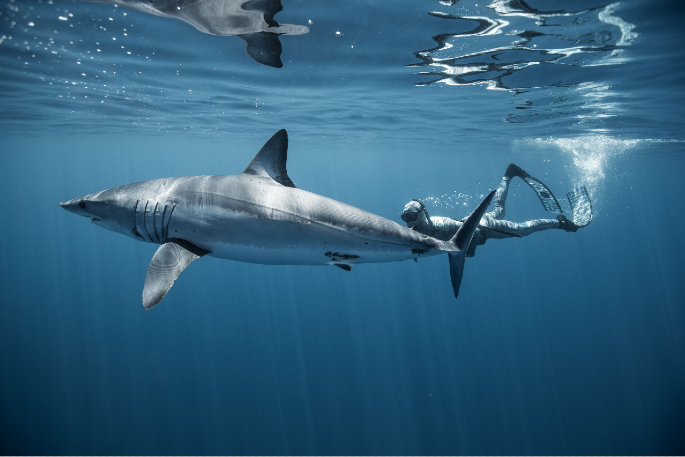A shark expert is warning beachgoers in the Western Bay of Plenty to be wary of great whites this summer, with one fisherman suggesting it is a matter time before tragedy strikes again.
The warnings follow numerous sightings of great whites in the waters surrounding Bowentown Harbour and the tragic death of 19-year-old Kaelah Marlow at Waihī Beach in January.
Tairua-based marine biologist Riley Elliott has been tracking the apparent higher incidence of sharks in the Bowentown area for nearly two years.
He is worried that with an influx of visitors descending on the region this summer, a situation akin to the 1975 movie Jaws could be bubbling.
'The problem is we are at the start of summer, and a million Aucklanders are deservedly going to want to get out, get in the water and have a summer holiday,” says Riley.
'But over the last two weeks I have had someone every day, out on their boat, reporting a great white shark.”
He says that since he began collating information, he has identified up to 15 different individual sharks. Whilst he does not want to scaremonger people out the water, he believes there is an increased threat.
'A girl died last year and we have daily reports of sharks in these waters.” he says.
Mark Wilson lives on the waterfront and is a regular fisherman in the area. He says there has been a clear increase in great white sharks over the past two years, with one shark as big as three-and-a-half metres long.
'Something will happen again this year,” says Mark. 'Someone is going to get taken, 100 per cent, just like last year.”
Riley submitted an application with the Department of Conservation last December for a permit to conduct research on the shark presence in the area, but he is critical of the 'circular” process.
DOC Marine Science advisor Karen Middlemiss says the DOC is continuing to process Riley's application, but could not provide further information on an ongoing application.
The DOC says localised research on the shark population is set for discussion at a hui on Monday.
'The DOC is continuing to collect samples that will contribute to a new population estimate in the future, and will be holding discussions on what research may be appropriate on white sharks in the Bay of Plenty with local iwi, other government agencies and university researchers,” says DOC marine expert Clinton Duffy.
Riley is now trying to highlight the issue to the public whilst the wait for research rumbles on.
'If I was a mum with a kid, and I went swimming and nobody told me then something happened, that would be wrong,” says Riley.
He is hoping to hold a question and answer session with locals, involving iwi, coastguard, lifeguards and police, this Friday.
The DOC clarify that most species of shark present little risk to swimmers but that sharks are a 'fact of life” in our waters.
'Places to avoid swimming are channels in harbours and estuaries, near river mouths and anywhere there is a potential food source for large sharks,” says Clinton.
Other precautions include swimming between the flags at patrolled beaches, not swimming at night or dawn and dusk, always swimming with someone else and avoiding areas where people are fishing. Riley is clear that the sharks are not to blame and, as a shark lover, he is concerned the marine creature's might be adversely impacted by growing interactions with humans.
Mark agrees, and both are surprised that no shark warning sign has been erected.
'People need to learn to be there with them and get educated,” says Mark.
'You can go down and swim with 15 of the world's most dangerous animals, apart from humans, but we don't want to put a sign up because it might scare someone.
'They need to put signs up for the holidaymakers because they have no idea.”
There is also confusion on where the responsibility of erecting shark warning signage lies.
The Weekend Sun understands that some organisations and agencies are currently awaiting the coroner's report on the fatal January shark attack, to see if there are any recommendations for responsibility to put signage in place.
Guidance from the coroner will then assist in identifying the best course of action.
Whilst Mark believes signs should be put up, he is aware of at least one local who says they would remove any shark warning sign put in place as it would be 'bad for business”.
The DOC have similar concerns.
'Signs like this have been used in other parts of New Zealand, but they tend to get souvenired or vandalised pretty quickly,” says Clinton
Riley, again, sees parallels with the movie Jaws.
'Why are there no signs?” he laments.
'It is really sad because it is literally how the movie starts. It is even worse because Covid is a factor, so they need tourism, but some information is better than another fatality.”

